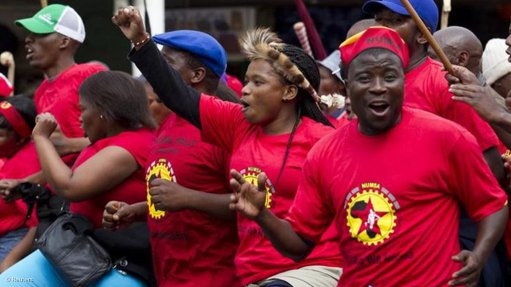
Photo by: Reuters
July 11, 2014.
For Creamer Media in Johannesburg, I'm Motshabi Hoaeane.
Making headlines:
The National Union of Metalworkers of South Africa rejects a 10% wage increase offer.
A UN report reveals that urbanisation is expected to add 2.5-billion more people in cities by 2050.
And, Kenya's coastal killings pose an insurgency risk for President Uhuru Kenyatta.
The National Union of Metalworkers of South Africa (or Numsa) have rejected the latest employers' offer to increase wages by 10% this year and 9.5% in 2015 and is extending a 10-day strike, union sources said on Friday.
A senior official said the union was still open for engagement with the employer, however, but the strike was continuing.
Numsa's secretary general and national spokesperson Irvin Jim did not respond to requests for comment.
More than half of the world's seven-billion people live in urban areas, with the top "mega cities" being Tokyo, Delhi, Shanghai, Mexico City and Sao Paulo, a United Nations report revealed. Mega-cities are those with more than 10-million inhabitants.
That proportion is expected to jump, so that more than six-billion people will be city dwellers by 2045.
Urbanisation, combined with overall population growth, will boost the number of people in cities by 2.5-billion over the next three decades, with much of that growth in developing countries, especially in Africa.
India, China and Nigeria will make up 37% of the projected growth in the next three decades, with India adding 404-million city residents, China 292-million, and Nigeria 212-million, by 2050.
The key challenge for these countries will be meeting the needs of their growing urban population with basic services like education, health care, housing, infrastructure, transportation, energy and employment.
Kenya may face a full-blown insurgency on its coast unless President Uhuru Kenyatta can douse a combustible mix of ethnic rivalries, land rows and Islamist militancy.
Gunmen have killed about 100 people since mid-June, exposing festering problems that could test Kenyatta's ability to reassure a nation fretting about wider security a little more than a year into his first term. Despite dozens of arrests, the government has yet to identify the culprits.
Investors have so far been unperturbed, piling into Kenya's debut Eurobond last month even as bodies were counted on the coast. However, if the government fails to stop those driving the attacks and address local grievances, Kenyatta's promise to lift already stuttering growth may start to look empty.
Also making headlines:
Gauteng premier David Makhura has announced the names of ten of the fifteen panel members who will be tasked with assessing the socioeconomic impact of the tolling system on the province, with the findings to be made by November 30.
Consultancy Frost & Sullivan’s African Utility Market Intelligence Report has highlighted an urgent need for power and water utilities to expand and improve their generation and distribution capacities.
And, Independent Electoral Commission chairperson Pansy Tlakula has filed an application in the Constitutional Court for leave to appeal the Electoral Court's ruling that her misconduct in 2009 warrants her removal from office.
Also on Polity today:
Watch the latest interview with political analyst Aubrey Matshiqi on the downgrading of South Africa’s economy bond rating and outlook.
Also be sure to read the latest opinion article by the South African Civil Society Information Service on government’s proposal to transfer 50% of land to farm workers.
Follow us on Twitter (@PolityZA) for updates on breaking news.
That’s a roundup of news making headlines today.